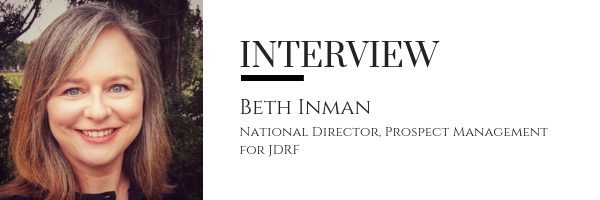
What makes prospect development a great career?
Apra-IL is asking local and national industry leaders what the field means to them and why and how they have pursued success in prospect development. Through this blog series, we will explore what drives industry leaders to propel their careers and prospect development forward.
For this month's piece. Joan Ogwumike, Apra-IL member and volunteer, interviews Beth Inman, National Director, Prospect Management for JDFR.


Beth Inman is the National Director, Prospect Management for JDRF, the world’s largest nonprofit funder of type 1 diabetes research, and is based in Charleston, SC; a position she’s held since November 2017. Prior to joining JDRF, she was the Senior Director of Prospect Management & Research Analysis at the University of South Carolina and Director of Development Services at The Citadel Foundation. At all three of these organizations, she was hired into newly created positions designed to introduce prospect management systems to drive the work of the major gifts enterprises.
Before her development career, Beth was the associate curator of American and decorative art at the Columbia Museum of Art in Columbia, SC. She is currently in her second year on the Ethics & Compliance Committee for Apra International and serves as Immediate Past President of Apra Carolinas. Beth is a native of Charlotte, NC and holds a bachelor’s degree in art history from the University of North Carolina at Greensboro and a master’s degree in art history from the University of South Carolina. She is mom to a 15-year-old daughter and is passionate about literacy, the arts, and women’s rights causes.

Apra-IL: Describe your journey into your current position.
Inman: My bachelor’s and master’s degrees are in art history and I went to graduate school with the goal of being a curator in an art museum. For the first part of my career, I worked as a curator for a history museum and then as the associate curator of American and decorative art at the Columbia Museum of Art in Columbia, South Carolina. They were both great experiences and I loved my work, but life led me to Charleston, South Carolina and continuing in the museum world wasn’t an option. I landed at The Citadel Foundation (the fundraising unit for The Citadel, The Military College of SC) in 2007 as the new Chief Development Officer’s executive assistant. That was such a great way to learn the ins and outs of development! I scheduled donor visits for him, accompanied him to meetings with Deans, sat in on meetings with the major gift officers, etc. About a year later, I was promoted into the new Director of Development Services position and over the next 3+ years, I created a prospect management program there.
In 2011, I moved back to Columbia, South Carolina to be the new Senior Director of Prospect Management & Research Analysis at the University of South Carolina. South Carolina was in the quiet phase of the state’s first $1B capital campaign and didn’t have a formal prospect management program, so I had my work cut out for me! In 2017, after almost 6 ½ years at South Carolina, I accepted the opportunity to be JDRF’s first National Director, Prospect Management. I saw it as a great way to utilize my experience in building higher-education prospect management program for a national cause-based organization. My first 18 months have been a whirlwind of learning a new database (Salesforce), learning how development works in such a large organization, and learning how to work remotely and it has been amazing!
Apra-IL: As a leader, can you tell us what motivates you in your current field? And perhaps whether your motivations have ever changed?
Inman: What motivates me is figuring out ways to identify more prospects, ‘clearing the tracks’ for my team so they can focus on what they do best, learning different ways to summarize & visualize data, and advocating for prospect management both within my organization and outside. I am also motivated by learning in the broadest sense; I get so excited when I have an opportunity to learn something new (I’ve been learning about Excel’s Power Maps) or when I figure something out/have an “a-ha!” moment (why a report wasn’t pulling the way it should). In many of our organizations, we are often the first place someone in our shop comes for help and that’s a great way to build relationships with gift officers, leadership, etc. and if we didn’t know the answer but found it, we learned something new, as well. Win-win! On the flip side, we can’t be afraid to ask for help either!
Apra-IL: What role has Apra played in your professional journey?
Inman: Apra, at both the national and chapter level, has played a significant role in my professional journey; I have learned so much about leadership, organization, delegating, conference planning, and even unexpected skills like updating our chapter’s website and filing with the North Carolina and South Carolina Secretaries of State offices! I am confident Apra will help me continue to add to this list as I progress in my career!
Apra-IL: Could you tell us one misconception people have about professionals in Prospect Development? What is the truth?
Inman: The role that prospect development plays differs slightly from organization to organization but something I’ve heard (granted, it’s been a long time) to describe us is “police” or that we’re “policing” what the fundraisers do. It used to make me angry because I vehemently disagree with the sentiment, but I learned to use those moments when the term came up to have a productive conversation about why they felt that way and also to educate them about how they can benefit from utilizing prospect development. Taking that approach proved to be helpful!
Apra-IL: How would you define a leader in Prospect Development?
Inman: Leaders in Prospect Development are nimble, diplomatic, open-minded, curious, persistent, and patient. It is also important to have the ability to think big-picture while also being comfortable “in the weeds.” We are often creating or editing policies and procedures so attention to detail is really important – at the same time, we’re also thinking about where we want our teams to be in the future so the ability to think strategically is also valuable.